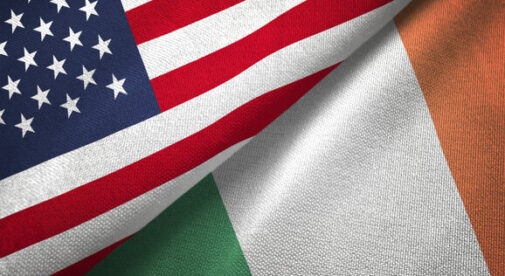As President Joe Biden will tell anyone, the links between the United States and Ireland are long and deep.
During the English colonial period, and later during the Irish famine years and political troubles of the second half of the 19th century, millions of Irish migrated to the U.S. By some estimates, nearly 12% of the U.S. population has enough Irish ancestry that they identify as Irish American.
U.S.-Irish links are qualitatively different from most other countries. During the independence struggle against England, thousands of Irish activists ended up in the U.S., where they raised funds and support for Irish freedom. To this day, there are strong and enduring political links between the Irish American community and that of the home country.
On the other side of the Atlantic, the Irish government has long encouraged such links—as well as immigration by the descendants of the Irish diaspora. Irish nationality policy grants Irish passports based on ancestry as far back as great-grandparents. The combination of those two factors means that thousands of Americans have acquired Irish citizenship.
Recently, the number of dual Irish-U.S. citizens has increased dramatically. According to Ireland’s Central Statistics Office, they increased by more than 70% between 2016 and 2022. More than half of those were born outside of Ireland, meaning they were American first. The number of U.S. citizens living permanently in Ireland increased by nearly 30% over the same period.
Clearly, Ireland’s welcoming approach to its ancestral diaspora is working. But there’s something else going on as well.
Many people are unaware that Ireland consistently ranks in the top three countries on the Heritage Foundation global rankings of economic freedom. It examines national policy on several fronts, assessing how freely residents can pursue economic activity without government interference.
Many Americans assume every European country to be more regulated than the U.S. Ireland, for example, has a public health system, which American ideology rejects as “socialism.” Overall, its social safety net is more robust than in the U.S.
On the other hand, Ireland is significantly friendlier to private enterprise and economic activity in general than any other country in Europe—and miles ahead of the U.S.
For example, Ireland is one of the few countries in Europe that sets no minimum capital requirements for new businesses. Germany, for example, won’t register a new business unless the owners pony up €25,000 ($26,921 at time of writing).
Ireland also has exceptionally strong protections for personal and business property rights—even better than the U.S. And its judiciary ranks better than the U.S. and most other European countries in terms of independence and effectiveness.
Overall, the Heritage Foundation gives Ireland an economic freedom score of 82 out of 100. The U.S. scores 70. The only other country in Europe that scores above 80 is Estonia. Most of the EU scores between 60 and 75.
One result of Irish economic freedom is that the rate of new company formation is increasing rapidly. Between 60 and 70 new companies are registered every single day in the country. For a population of just over 5 million, that’s incredible.
Paradoxically, one reason for the strong new business formation is Ireland’s social safety net. In the U.S., most households get their medical insurance from an employer. Quitting to start your own business means losing coverage. In Ireland, by contrast, you’re covered by the Health Service Executive, so you don’t have to worry about healthcare if you decide to strike out on your own.
Putting all this together, I suspect one reason so many Irish Americans are exercising their right to citizenship in their ancestral homeland is that it’s a better economic environment.
So, if you’ve got enough Irish in you, applying for a second passport from the Emerald Isle could be your ticket to future prosperity.
 Ted Baumann is International Living’s Chief Global Diversification Expert. He’s traveled to nearly 90 countries and is a dual citizen of the United States and South Africa. Ted has been published in international research journals, as well as in media outlets such as Barrons, Forbes, and Cheddar. Learn more about Ted Baumann here.
Ted Baumann is International Living’s Chief Global Diversification Expert. He’s traveled to nearly 90 countries and is a dual citizen of the United States and South Africa. Ted has been published in international research journals, as well as in media outlets such as Barrons, Forbes, and Cheddar. Learn more about Ted Baumann here.
[second_passport_signup]
Related Articles
When It Comes To Mobility, You Are Your Country
Second Passports Aren’t Just For The Rich
A Second Passport Can Be A Life-Saver… Literally
[post_takeover]

